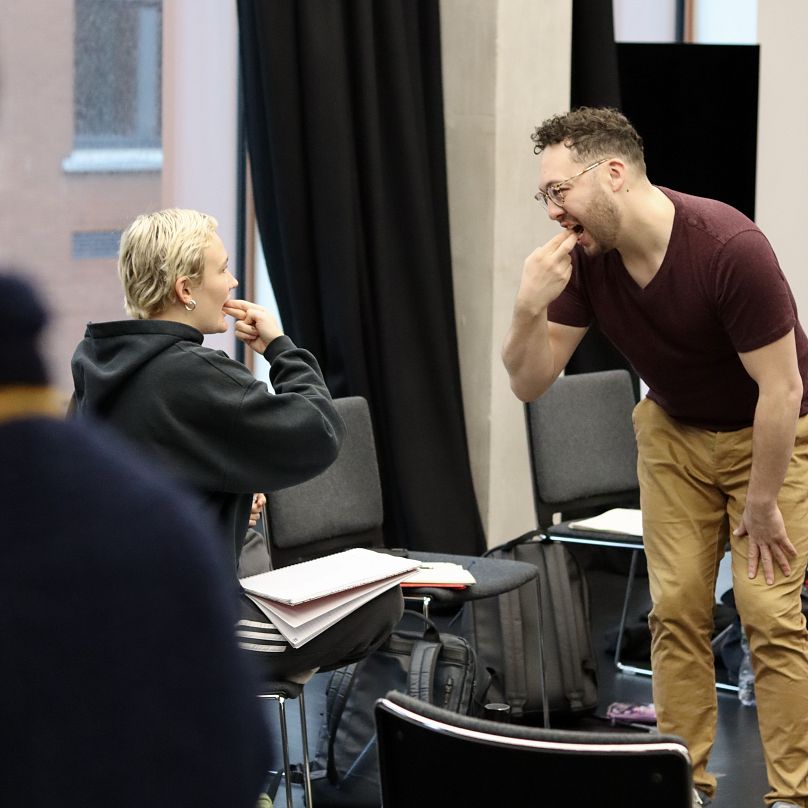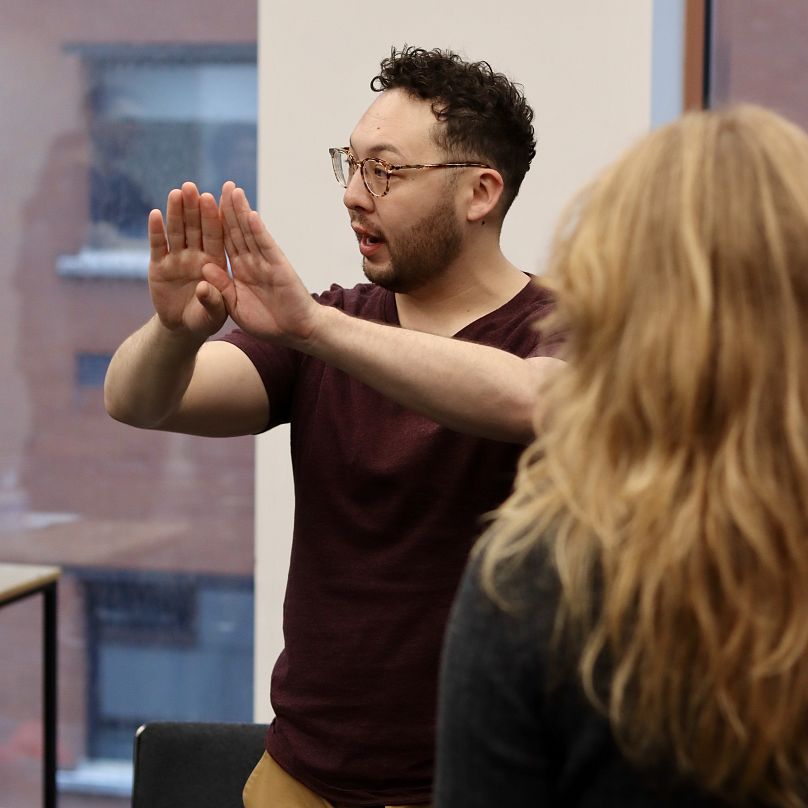Sam Malone is a professional vocal coach but instead of just working with actors, he's expanded his practice to therapeutic and business clients.
What do an executive struggling to be taken seriously in meetings, a queer professional told his body language was distracting, and a drama student who couldn’t find a powerful voice have in common? They’ve all sought out the teachings from a dramatic vocal coach.
Vocal coaches are commonly employed in the dramatic arts, used to help a theatre actor to project their voice to the cheap seats, or to guide a film actor through an unfamiliar accent. But the same techniques that aid actors can be just as important in therapeutic and business settings.
Sam Malone is a vocal coach and the founder and CEO of Elevate Voice, a company focused on bringing dramatic vocal techniques to people from all walks of life. Based in the UK, Malone was living in his native Canada working in HR for an oil and gas company but felt that he couldn’t express his voice fully.
As a double major in business and drama, Malone went to his school’s voice tutor for advice. “She basically taught me that it was okay to take up vocal space as someone who was LGBTQ+,” he explains.
Vocal space, Malone explains, is a broad term that ranges from the confidence to loudly assert yourself, to the comfort in expressing yourself with the most honest version of your own voice. Malone points out that an example of someone who might not have access to their vocal space could be a gay man living in a conservative area, where they have to hide the way they want to express themselves for their own safety.
“Queer people, women and people of colour have a tendency to, through trauma and other issues, self minimise. That can mean making themselves smaller, both physically and vocally. In doing that, people start to lose their voices,” Malone says.
The experience with the voice tutor inspired Malone to set up his own practice in the UK as a vocal coach, guiding anyone from drama students to top-level executives in how to access more vocal space.
Behind the practice of vocal coaching, there’s a wealth of academic theory. Kristin Linklater, Patsy Rodenburg, and Roy Hart are some of the big names in the field that have inspired Malone’s practice. But most of the work comes in the room with the individual, whether that’s through breath work or finding physical expressions through an activity like martial arts.
In practice, Malone has had multiple successes bringing people out of their shells through vocal exercises.
A business woman, a professional, and a drama student
A recent client was a high-level executive who felt that her contributions to meetings weren’t being taken seriously enough. It’s a typical issue for women in the workplace, and this woman came to Malone for help ahead of a major conference presentation.
“I'd see myself mainly as a guide,” he explains. “We did a few different voice exercises, whether it was her learning to ground through her feet, or release her jaw, and then just letting her voice out and owning that space.” Just through a few exercises, the executive gained a level of resonance that she had shied away from when presenting before.
Malone had a similar experience with a professional who had been told his voice and expressive movements were distracting in the workplace. The professional is a queer man, and when Malone met him, the feedback had clearly destroyed his confidence to fully express himself in space. “I had to remind him that he had the permission to use his arms,” he says.
It was in a theatrical setting that Malone most recently experienced the breadth of vocal coaching’s positive impact. While working with a student at a prestigious drama school, he noticed the breathing exercises weren’t opening up the student’s range.
Despite all the relaxation and vocal exercises, Malone could see the student’s body was still taut. “I said, ‘You don’t have to be so strong’ to him,” he recalls. The student was afraid of appearing vulnerable in the space, and that had manifested into a physical tenseness in his chest.
“When he started to release, he had a very deep emotional release. A deep wailing sound came up in the release of that. And vocally afterwards, he was much more open,” Malone says. It’s a typical example of how it’s not just our minds that hold our emotions, but our bodies too.
The link between our bodies and our emotions is one explored in depth in the bestselling psychiatry book The Body Keeps the Score by Bessel van der Kolk and is a major touchstone for Malone’s practice.
Try it yourself
Malone continues to travel around the UK providing vocal coaching sessions for actors and businesses. If you want to try a quick vocal exercise to see how effective it can be, here’s one you can do in the next few minutes.
Place your hands over your belly button and inhale through your mouth. Instead of letting your belly contract as usual, with each inhalation, your belly goes out. With each exhale, it goes back out.
By moving your belly out on the inhale and in on the exhale, you’ve given more space for your diaphragm. Do this for a few minutes and then see how your voice feels, it may project just that bit further.













